Savannah Simon, motivational speaker-entrepreneur
“Whenever I spend time with my language, it lifts my spirit… It reminds that this is the language of our ancestors.”
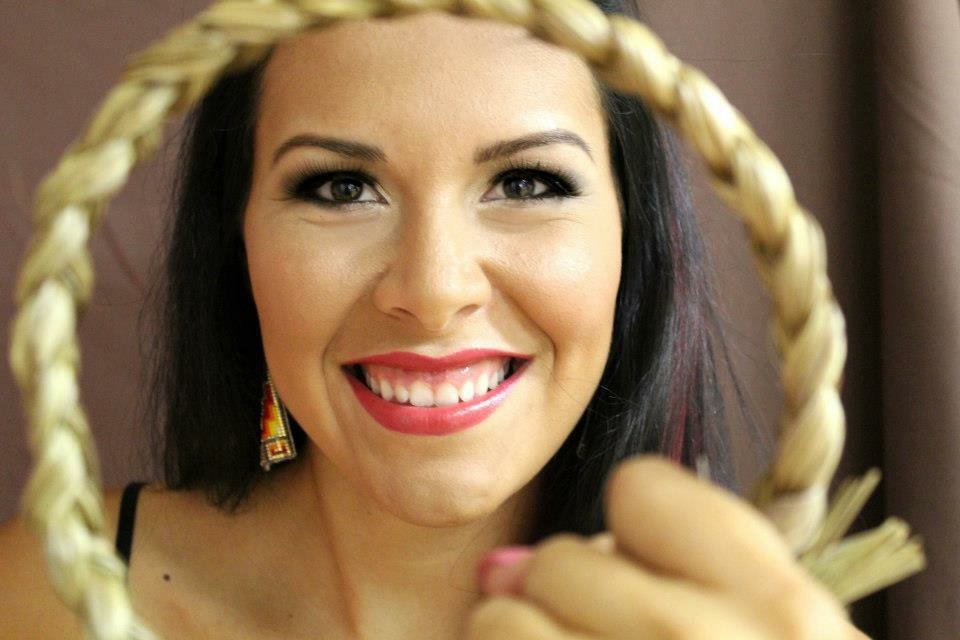
When Sarah Francis was 10 years old, she was taken from her family in Elsipogtog Mi’kmaq Territory in New Brunswick and sent to live at the Shubenacadie Indian Residential School in Nova Scotia. For six years, she was forced to abandon her culture. If she spoke her native Mi’kmaq language—even in prayer—she was beaten.
After Sarah was released from the school in the early 1940s, she met and married William John Simon Sr. of Elsipogtog First Nation in New Brunswick. Fluent in Mi’kmaq, William retaught his wife the language, and the pair went on to raise their 19 children speaking the same tongue.
Those lessons—of darkness and of light—left a lasting mark on Sarah Simon’s granddaughter Savannah (Savvy) Simon. “Hate took the language away from my Migitjo, but love brought it back to her,” says Savvy. “She’s one of the most graceful people I’ve ever seen; that’s why I admire her so much. She has forgiven what has happened to her and she still goes to church, she still believes in God and she still sings gospel in her church. She’s just amazing; she doesn’t let (her past) weigh her down.”
There’s little doubt that Savvy inherited her grandmother’s capacity for positivity and resilience. Raised mainly by Sarah and her single mother, Savvy struggled with feelings of abandonment because her Ojibway father, Mardy Porte, was “nonexistent in my life.” Yet she always stayed true to her desire to live a clean, sober life; while many others in her Elsipogtog community turned to drugs and alcohol to cope with their demons, Savvy followed the Red Road, as her grandmother has done all of her 91 years.
“When you walk the Red Road, your soul is in alignment with the creator,” says Savvy. “Your spirit is in a good place—not altered with drugs or alcohol or anything like that.”
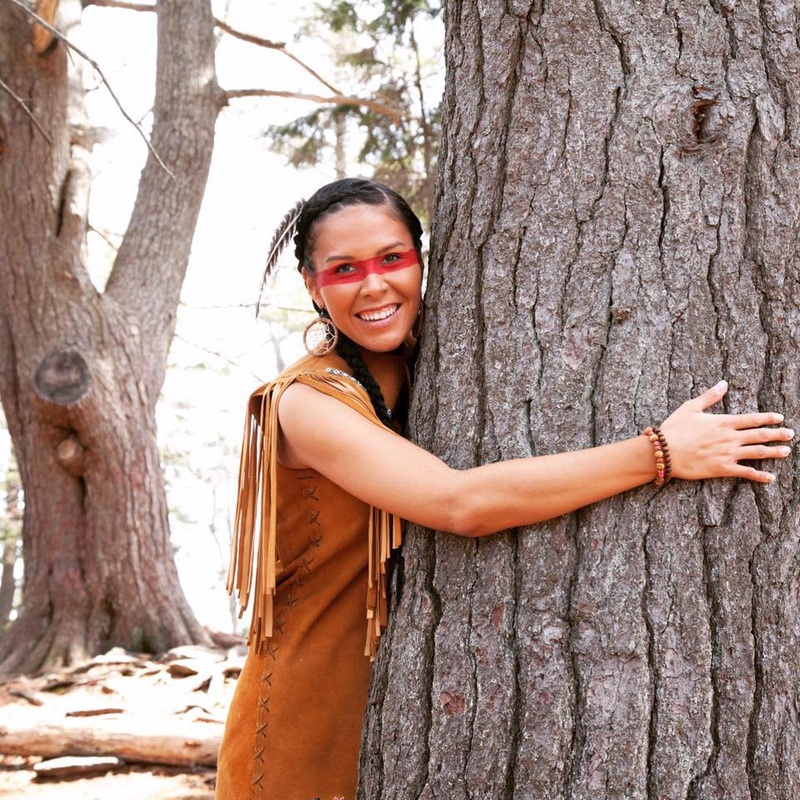
Photo: Jordan Blackburn Photography
As a young woman in Elsipogtog, Savvy felt an intrinsic responsibility to set a good example. The first of three children and among the eldest of her many cousins, she soon became a youth leader for her Mi’kmaq tribe and was heralded by her elders as a positive role model.
So, she continued to apply herself. After finishing high school in 2005, Savvy enrolled in a tourism management program at Nova Scotia Community College before transferring to business marketing at New Brunswick Community College. Once she completed her diploma in 2009, Savvy took work with Indigenous and Northern Affairs Canada in Amherst, Nova Scotia, at her mother’s urging.
Although Savvy enjoyed the security of a well-paid job with a good pension, her spirit kept longing to do other things. So, throughout her years working in the government, she pursued her true passions on the side.
Savvy was a native dancer at the Vancouver 2010 opening ceremonies. In 2012, she became the first native woman to work at Dolly Parton’s theme park, Dollywood, where Savvy was part of a six-week collaborative culture show. (“I met Dolly. She’s funny and sweet.”)
The following year, Savvy danced in Halifax, Nova Scotia with the band Mi’kmaq Nation, opening for Shane Yellowbird and Buffy Sainte-Marie—a particularly special night for Savvy, both because Queen Elizabeth attended the show and, more importantly, her musician father had played with Buffy.
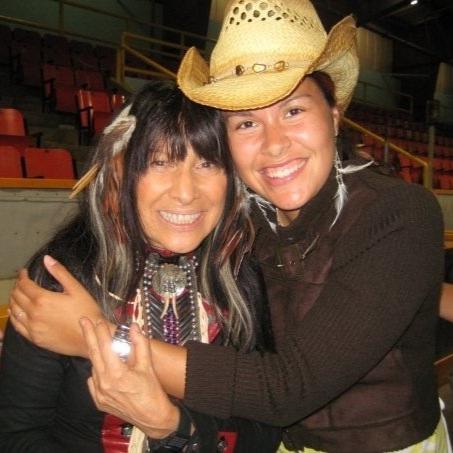
With Buffy (left), Halifax, N.S., 2013
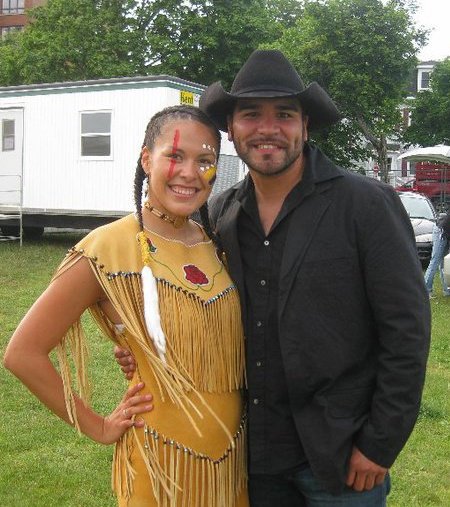
With Shane Yellowbird, Halifax, N.S., 2013
Also in 2013, Savvy was a prayer warrior at Elsipogtog during the “No Fracking” blockades to prevent shale gas explorations. (And she greatly impressed Shawn Atleo, then National Chief of the Assembly of First Nations, with the collaborative youth video she spearheaded, Solidarity in Protecting Mother Earth.) Savvy also travelled to Rio de Janeiro, Brazil for a mission trip that culminated in live prayer on a beach with Pope Francis, along with roughly 2.5 million others, for World Youth Day 2013. “Just hearing his words live in person, on the stage, was so beautiful,” says Savvy. “His main message was, ‘Go out there and love.’”
For Savvy, the message resonated. While in Rio, she’d also taken a testimony-writing course, in which she wrote down everything she was ashamed of and hurt by, in an exercise of acceptance and letting go. “It really helped me see that by sharing your stories, you help others who are stuck in their own prison.”
That experience turned out to be a game changer for Savvy. When she went home, she knew she couldn’t suppress her spirit any longer. So, she stepped out of her comfort zone and launched her own company, Savvy UnLtd., to become a full-time motivational speaker.

Savvy UnLtd.
Savvy UnLtd. is just that: unlimited. Her company puts no limit on age, gender, race or location when choosing where or with whom Savvy will share her wisdom. Through her business, as well as with the International Indigenous Speakers Bureau, she delivers talks on a range of subjects, including leadership, entrepreneurship, language revitalization, dealing with bullying, youth addictions and her Red Road story.
Savvy has her own YouTube channel, featuring videos like Repeat After Me, a series of self-affirmations. And through all her talks and posting, she advocates the Positive Vibes Only movement because “the world has enough critics.” (She has also recently expanded her business to offer essential oil wellness through doTERRA.)
Her work has made her a go-to resource in many circles. High schools, colleges and universities from around the world incorporate her videos into their curricula as valued educational tools. She’s also been featured in several books, including the 2015 Urban Tribes: Native Americans in the City, a collaborative book by Lisa Charleyboy and Mary Beth Leatherdale about “natives who are doing cool things in North America,” and the 2016 McGraw-Hill textbook Moving Forward: A Collection about Truth and Reconciliation.
On top of all that, Savvy was named one of Canadian Living magazine’s Top 40 Female Changemakers in 2015 and was the only First Nation speaker at WE DAY Halifax in 2016.
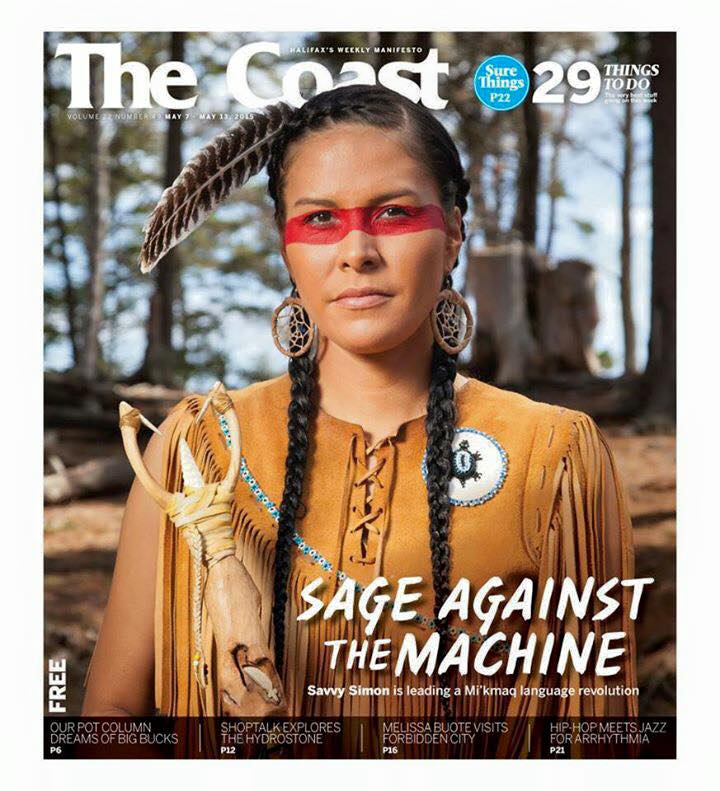
On the cover of “The Coast”
#SpeakMikmaq
Once word got out about Savvy’s positively engaging videos, she had another idea for the platform. After a lifetime of being told that her language was dying, she decided she was through feeling helpless about the situation. In 2014, she started the #SpeakMikmaq Revolution.
“I wasn’t seeing enough change in my generation, and I thought it would be cool if people could type that hashtag on social media and learn more words,” says Savvy. “I wanted to pump youth up and show that there’s an easy, simple way that we can do this. Maybe we only know a few words or phrases, but let’s share what we do know and use a hashtag, and that might inspire other people to share what they know.”
Savvy created a Speak Mi’kmaq playlist and has been continually gathering new followers to her revolution. Among many examples of people whose lives have been positively changed by #SpeakMikmaq, she cites two:
- A young Mi’kmaq woman from Norway who had lost her roots but reconnected with her culture through #SpeakMikmaq. “She moved to Newfoundland, got the regalia and is now making regalia for others, dancing at powwows—all this tremendous cultural work from a hashtag. It just blows my mind.”
- A Quebec woman who struggled with depression until she found the language movement. “Because of the positive vibes, she’s no longer taking antidepressants. She said that she tunes into me every day and watches my Repeat After Me video, and gives out free hugs at her powwows. It’s beautiful.”
The language videos even prompted requests for clothing, so Savvy has been designing and selling clothes for all age groups, featuring Mi’kmaq words, symbols and quotes. She’s buoyed by the fact that Indigenous youth—and others—are taking to the movement, and hopes that more people will realize the positive power of reconnecting with their roots.

Photo: Nicole Lapierre Photography
“Whenever I spend time with my language, it lifts my spirit,” says Savvy. “It’s an automatic, positive thing… What it does for me as an Aboriginal person is it just makes me feel like I understand myself so much better and I feel more confident. It adds to my self-esteem, it reminds that this is the language of our ancestors.”
Not that Savvy thinks the Speak Mi’kmaq revolution holds value only for Indigenous people. She encourages everyone, including non-Indigenous people, to participate. “I have a few fans who are keen on speaking Mi’kmaq who are not Indigenous. I’ve adopted them into the tribe because the language means a lot to them. I love that; I embrace that. If my language is going to make you happy, that’s awesome.”
Top among the list of words Savvy most wants to impart?
- Kesalul – “I love you”
- Nemultis – “I’ll see you again” (“We don’t say ‘goodbye’ because we believe that we’ll meet again, whether on this Earth or in the spirit world.”)
The response to #SpeakMikmaq has been overwhelmingly positive. But it hasn’t come without its detractors. “That’s what happens with success,” says Savvy. “Once you become successful, you’re going to have people throwing shade. It’s just part of the territory.”
In Savvy’s case, the negativity hit pretty close to home. At the beginning of her language movement, nearly all of the cyberbullying came from her own tribe. “It’s really sad because it’s a big sign that the oppression has totally owned my people and leaks out in the ugliest ways,” she says.
The online attacks nearly caused Savvy to go silent—until she reminded herself of why she started the revolution in the first place. “There are a lot of parents out there with Mi’kmaq kids who don’t have resources and are relying on my videos. So, I continued to do it and didn’t give up.”
In a rare break from her focus on positivity, Savvy released the video Keeping Our Talk, in which she accuses her bullies of being no better than the people who stole her grandmother’s language from her and many others. “I just wanted to do a wakeup call, not just for them but for all native people who are still stuck in that oppressive mindset. I wanted to tell them, ‘It’s not just me you’re hurting; you’re adding harm to our tribes and we’re not going to grow if it keeps going on like this.’”
For the most part, though, Savvy doesn’t respond to cyberbullying. “My approach is to ignore, block and remove their negativity. I don’t waste my precious time responding to them… I focus on the positive and don’t let them own my thoughts or my days.
“Hurt can’t heal hurt; only love can heal hurt. I always believe that love is the answer. So, when in doubt, love. If somebody’s sad and you don’t know what to say, give them a hug; it says things we can’t with words. If you pass someone, give someone a smile; you never know how your smile could save someone’s life. All people want is to feel acknowledged. Everyone’s facing battles that we know nothing about, so I keep that in mind. That’s why I give out free hugs randomly.”
“With a smile you will never forget and a presence that will light up your heart, Savvy Simon is changing our world one hug at a time. Teaching us to choose happiness, to the be the change and the positivity we seek and to remember we are the generation of love, Savvy doesn’t just talk the talk; she is the embodiment of it all.” —Kickass Canadian Shannon Loutitt, honour runner & International Indigenous Speakers Bureau cofounder
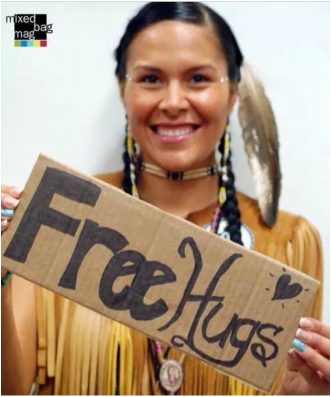
A light in the dark
Positive though she is, Savvy is honest about her own battles. Growing up without a father left her feeling unloved and unworthy, as if she were “missing a piece.” She stayed away from drugs and alcohol, but tried to fill the emptiness with boyfriend after boyfriend, leading only to heartbreak after heartbreak. “I really had a lot of anger towards my dad and I really struggled with that.”
Her mother didn’t want her to meet her father until she turned 18. But by the time she did, she learned that her father had died in a car crash less a year before. “It never occurred to me that I wouldn’t meet him,” says Savvy. “It was always on my to-do list. When he passed away, I had to forgive him and I had to really work on that part of my life and myself.”
Eventually she found forgiveness and it played a big part in her healing. After “enough heartbreaks and pain,” Savvy decided to take time out for herself—to stop dating and start focusing on personal and professional growth. That choice led her to where she is right now: in Fredericton, New Brunswick, building a healthy future for herself and her beloved one-year-old son, Waseteg. She’s moving away from designing clothes (other than maybe a few limited edition Positive Vibes Only garments a couple times a year) to focus on being a wellness advocate for doTERRA essential oils. She also has ideas for a children’s Mi’kmaq book and a non-fiction adult book.
And she plans to continue being a motivational speaker “probably until the day I die” so she can help impart the valuable lessons she’s learned so far. In particular, she hopes to see today’s Indigenous youth embrace self-care. To Savvy, it is the clearest path to a better future.
“I really believe that as a native people who have experienced this tragedy of residential schools, we have to wake up and take responsibility and heal ourselves from that pain and not be stuck in the victim mindset anymore,” she says. “And we have to own what we can, and that is self-care. Let’s take care of ourselves, let’s make sure that we don’t trickle down those multigenerational effects that our parents and grandparents lived with. Let’s make sure to put a stop to that and to hug our children, tell our children we love them, not be abusive to them, be as kind and culturally supportive as possible.”
Savvy is already putting that into practice with her own son. She’s determined that the cycle of trauma within her own family will end with Waseteg. “This is where it stops. Waseteg is going to grow up with the culture, he’s going to grow up with the language, he’s going to grow up with love and communication. We’re going to talk to each other and I’m going to listen to him and let him be who he wants to be in life.”
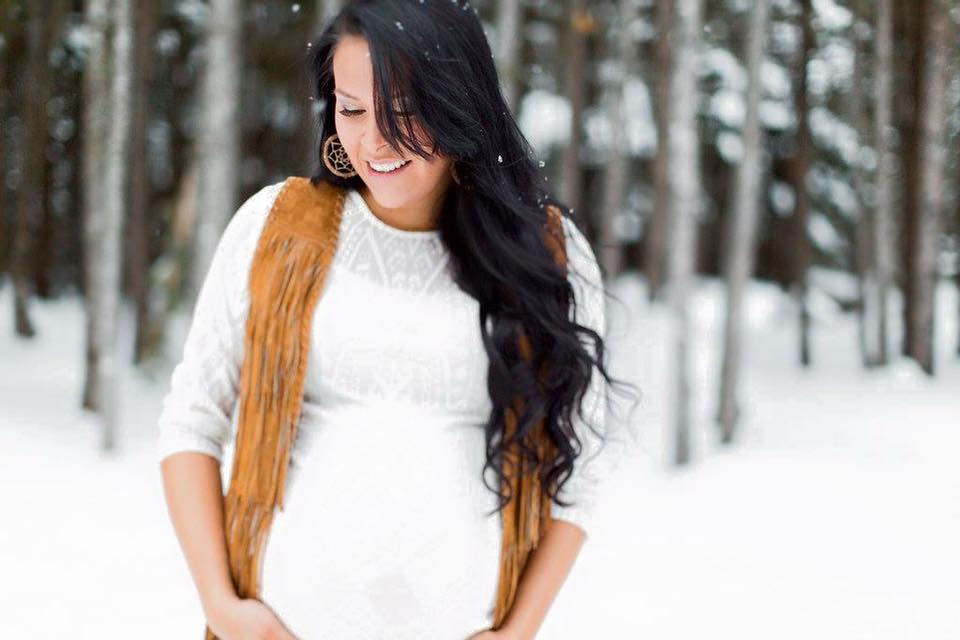
While pregnant with Waseteg, Halifax, N.S., 2016; Photo: Nicole Lapierre Photography
She’s still deciding whether to start Waseteg out learning Mi’kmaq or Maliseet. Either way, Savvy is confident that things will be different—better—for her son. “I grew up feeling like I had to heal from my past. I don’t want Waseteg to grow up having to heal from his upbringing; I want him to grow up and flourish as an individual, as he deserves to.”
“Waseteg” is the Mi’kmaq word for the first light that shines in the morning—the first light after the darkness. It holds a lot of meaning for Savvy, as she continues to embrace positivity and create a happy life for her son.
It also pays loving tribute to the light that has guided her path since she was a young girl, showing her the way she wants to go. “Honouring my ancestors’ history is something that’s very important in my life,” says Savvy. “I always tell the youth I speak to, ‘Our ancestors had it a lot harder than we do today. Let’s make them proud.’”
* * *
For the latest on Savvy, visit SavvyUnLtd.com, ‘Like’ her Facebook page or follow @SavvyUnLtd on Twitter.
Thank you to Kickass Canadian Shannon Loutitt for recommending Savvy for this website.
 Kickass Canadians
Kickass Canadians
Thank you so much for sharing Savvy’s story. I am proud of her and thankful for who she is. I pray that she will continue to spread her wings for all Canadians to be inspired.
My pleasure, Gladys! Glad you found and enjoyed the piece.
Thank you so much, Gladys, that’s very kind of you. Prayers to you and your family as well 🙂